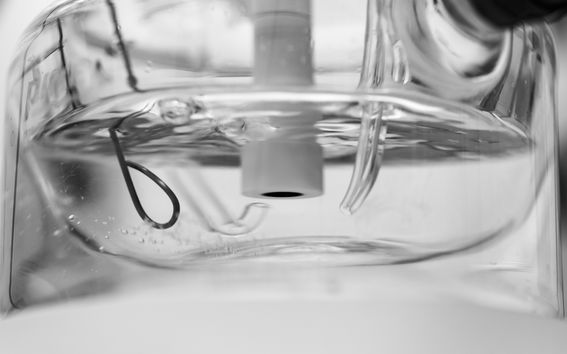Put the brakes on climate change – producing high-grade chemicals from carbon dioxide

After the publication of a climate report (IPCC) last autumn, climate change has been an everyday discussion topic. Among other things, emissions from energy production contribute to global warming. They also cause illnesses and premature deaths. Instead of fossil fuels, the use of renewable energy should be increased.
The production of renewable energy is currently financially profitable, and approximately 10% of energy is already produced by wind or solar power. However, wind and solar energy are seasonal in nature, and the peak and low seasons of production and consumption do not usually meet. At the moment, there are no sufficient alternatives for energy storage, which limits the use renewable energy.
Chemical energy, that is, chemicals produced through an electrochemical reaction, can be transported and stored in large quantities, and can also be used as raw material in the chemical industry or as transport fuels.
A catalyst producing hydrocarbon is being developed through a combination of computational and experimental chemistry
The most useful chemical compounds storing energy, energy carriers, are different hydrocarbons produced in electrochemical reactions and hydrogen produced from water. The four-year USVA project led by the School of Chemical Engineering Professor Tanja Kallio focuses on developing new and effective electrocatalysts to convert carbon dioxide, a major cause of global warming, into hydrocarbon. The plan is to reach this goal by combining experimental and computational chemistry.
Kallio started studying the topic approximately one and a half years ago. The 870 000 euros funding granted by Jane and Aatos Erkko Foundation proves that the research topic is very important.
“Electrochemical reactions converting carbon dioxide into other products still need more research and development”, Kallio says. “In particular, selectivity still needs to be developed in order to gain the desired compound instead of a range of different hydrocarbon mixtures.”
“Carbon dioxide, in itself, is a very stable molecule. A catalyst plays a big role in activating carbon dioxide so that it reacts and turns into other compounds. The purpose of our experimental research is to develop new types of catalyst materials or combine the ones we have previously developed in a new way. Here in Aalto, we have a lot of potential for this. We have expertise in the production of new types of nanomaterials, and we have access to great technologies, such as atomic layer disposition (ALD) for the production of tailored structures. These could be useful in the development of catalysts.”
Professor Kari Laasonen’s research group uses computational chemistry in the USVA project in order to understand why catalysis either works or does not work.
“Our aim is to understand the electrochemical reaction mechanism in great detail, in order to enhance its efficiency and selectivity. Our final goal is to learn how to direct these reactions, but this is very challenging”, Laasonen says.
Promoters of science, research and art
Aalto University and the Jane and Aatos Erkko Foundation have common goals: both aim at promoting high-quality science, research and art. In 2017, the foundation granted Aalto University 3 million euros for its fundraising campaign and 300 000 euros for a new professorship in technology education. In recent years, Aalto University researchers have received almost 4 million euros of funding from the Future Makers programme funded by the Jane and Aatos Erkko Foundation in cooperation with the Technology Industries of Finland Centennial Foundation. The programme provides support for research openings that facilitate the renewal of society.
Further information:
Tanja Kallio
Professor, Aalto-yliopisto
tanja.kallio@aalto.fi
Kari Laasonen
Professor, Aalto-yliopisto
kari.laasonen@aalto.fi
Read more news

Nature of Process: Exhibition by the students of the ‘Personal Exploration’ Course
Nature of Process is a multi-material exhibition of 14 Master´s students of Aalto ARTSEden Telila's master's thesis contributed to Ramboll's geotechnical toolkit
Geoengineering alum Eden Telila helped Ramboll automate manual tasks.
Doc+ connects research impact with career direction
Doc+ panels have brought together wide audiences in February to discuss doctoral careers and their diversity.






